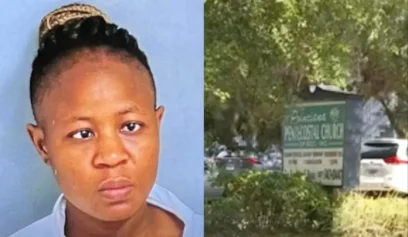Eight months after Belgium’s Africa Museum capped a modernization project to rid itself of a racist and pro-colonial image, white party-goers showed up to an Africa-themed party Sunday at the museum in blackface, pith helmets and tiger-striped bodycon dresses. Tigers are not native to Africa.
Emma Lee Amponsah, of the Café Congo art appreciation organization, told the Bruzz newspaper “explain to me how an event like this can still exist in 2019.”
“Ethnic, exotic or African is not a costume that you can put on and take off,” she said.
Kjell Materman, of the event’s planning company Thé Dansant, defended the attire in an interview with The Telegraph.
“Even if one person painted his face black, it was not meant to be offensive,” Materman said. “Many people of African origin were enthusiastic about the concept and were present.”
Materman said in media reports that he and other organizers had asked attendees to dress colorfully and to use African prints.
“I think it is very unfortunate that Thé Dansant does not see that an ‘African fancy dress party’ can cause angry reactions, and all the more so at this location,” Primrose Ntumba, a museum spokeswoman, told The Telegraph.
Guido Gryseels, the museum’s director general, told The New York Times in an interview last year that its $73 million modernization was part of an effort to distance the museum from a misconception that it celebrated colonization.
“Entire generations of Belgians came here and got the message that colonialism was a good thing, that we brought civilization and welfare and culture to Congo,” he said in the interview.
So when the museum got word that an event it agreed to — albeit based on the recommendation of the municipality of Tervuren, where it’s located — would have an Africa theme, the concept raised several red flags.
“When the event was announced on Facebook, we noticed that the dress code suggested by Thé Dansant would likely encourage highly clichéd and stereotypical representations of people of African origin,” the museum said in a statement posted Wednesday on Facebook. “The museum immediately contacted Thé Dansant to point out the potential consequences of this approach, and to ask the organizers to change the dress code.
“This measure turned out to be insufficient as some of the participants still chose to wear stereotypical outfits. A number of hurtful and humiliating photos taken during the event are now circulating online.”
The museum admitted it “misjudged this situation and should have played a greater role in imposing clear requirements and/or conditions in advance.”
“We take this incident seriously, and want to apologize for mishandling the situation in such a way that this took place,” the museum said in the statement. “We take responsibility for this lapse in judgment, and are working on an ethical action plan for upcoming events so that this will not happen in the future.”


